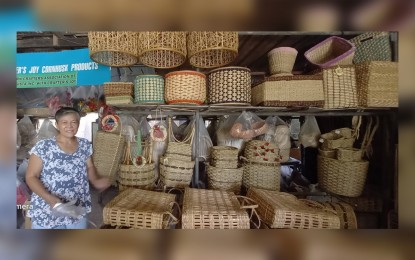
KEEPING BIZ ALIVE. Jocelyn Ong-Perez, owner of Crafters Joy Cornhusk Products, says MSME owners' will to succeed amidst the challenges and government measures to uplift the sector will buoy the sector during the pandemic. She said the government continues to help small businesses and stakeholders are thankful for these. (PNA photo by Joann Villanueva)
BASISTA, Pangasinan – Keeping businesses afloat amid the pandemic is really a struggle but a combination of commitment among investors to surpass the challenges and government interventions are vital to keep operations resilient.
Jocelyn Ong-Perez, owner of Crafters Joy Cornhusk Products, based here, and the president of Philippine Exporters Confederation, Inc. (Philexport) for Region 1, said the primary factor that will ensure that micro, small, and medium enterprises (MSMEs) remain in operations is for people to buy their products.
Perez, however, admitted that this is hard to do now because many have lost their jobs.
“For me, it should be the government first because they have the money. They have the money to purchase the items that they give out as gifts and for the decoration in their offices,” she told PNA on Wednesday.
Perez said there have been a lot of changes under the current administration that uplift the MSME sector.
She said the Department of Trade and Industry (DTI) and the Department of Science and Technology (DOST), among others, have upped their mentoring programs.
She said DTI has its Kapatid Mentor Me Project (KMMP), which is implemented in coordination with the Philippine Center for Entrepreneurship (PCE).
Under this program, representatives from large corporations coach and mentor stakeholders from MSMEs on different aspects of business operations.
It also has an Adopt-an SSF (Shared Service Facility) program that provides MSMEs access to SSFS in their community.
Another component of the KMMP is the Inclusive Business (IB) model, wherein MSMEs are linked into large companies’ value chain.
Perez said these mentoring programs are what small business owners need “because majority of the businessmen in the Philippines don’t really know how to go into business. It’s a sari-sari store mentality.”
“Para kang nag-MBA in a very short period of time, which is really what we need (It’s like you underwent MBA (Masters of Business Administration) in a very short period of time, which is really what we need),” she said.
Another issue that hampers the progress of MSMEs in the country is the lack of entrepreneurial mindset among Filipinos, she said.
This mindset is what the mentoring programs of various government agencies aim to address, she said.
“They are spending so much for the seminars and webinars for us and I believe that it will help,” she said.
She said the Small Business Corporation (SBCorp), through DTI, extended zero-percent loans with a two-year tenor for MSMEs when the pandemic hit.
She said SBCorp extended a PHP300 million loan facility for Philexport, which, in turn, provided as much as PHP200,000 worth of loans to good standing members with six months moratorium and a 5-percent processing fee.
“They are very lenient, which is a lot of help for the MSMEs. The requirements are still stringent, but these are better than applying for a bank loan,” she said.
For her own business, which primarily uses corn husks to produce bags, baskets, and other handicrafts, Perez said demand has declined because of the pandemic.
She also produces salted eggs, which, are more in-demand than the handicrafts she sells.
She started her home-based business in 2006 when Basista’s cottage industry, known for its bamboo and sea-grass-based handicrafts, weakened after China started mass producing various products.
The fourth-class municipality, which is around 80 percent farming community, relies on rain to water its rice fields. Another product that the municipality is known for is corn.
Perez said Basista has about 6,500 hectares of land area that are planted with corn, which, produce around 65,000 husks based on Department of Agriculture data.
She said majority of these husks are burned and only around 5-10 percent are used as cow feed.
Noting the large volume of waste and its impact on the environment and the need for people to have income, Perez then started her business with around 100 families and formed an association after training them.
She said the number of association members is now down to around 70 because some families started to just rely on government aid.
Initially, she provided the materials to the families and just pay the latter based on commissioned works, but the families are now sourcing the materials on their own.
“They don’t want to harvest the materials before. They did not believe that it (the business) will not last. Now they collect it themselves and sell it among themselves,” she said.
Aside from holding trainings in Pangasinan, she said she has also conducted corn husk handicraft-making around the country.
Previously, she joined trade fairs, both here and abroad, to increase sales but because of the virus-induced crisis these events have mostly been put on hold.
“That’s why we are very thankful to SM and DTI for giving us the chance to hold physical trade fairs in the province,” she said.
SM has allowed trade fairs in their Pangasinan branches in Mangaldan, Urdaneta, and Dagupan.
The DTI urged MSMEs to tap electronic commerce (e-commerce) to sell their products, but Perez said physical presence really makes a big difference to showcase their products than just doing it online.
She has a Facebook page for her business but said most of those who message her are people who attended trade fairs she has joined.
She, on the other hand, noted that her Facebook was instrumental in attracting a client from Vietnam.
“People are now ordering through online facilities and that’s what I want to tap,” she said, adding that online shopping sites Lazada and Shopee, through DTI, are offering MSMEs opportunities to open their own stores. (PNA)
